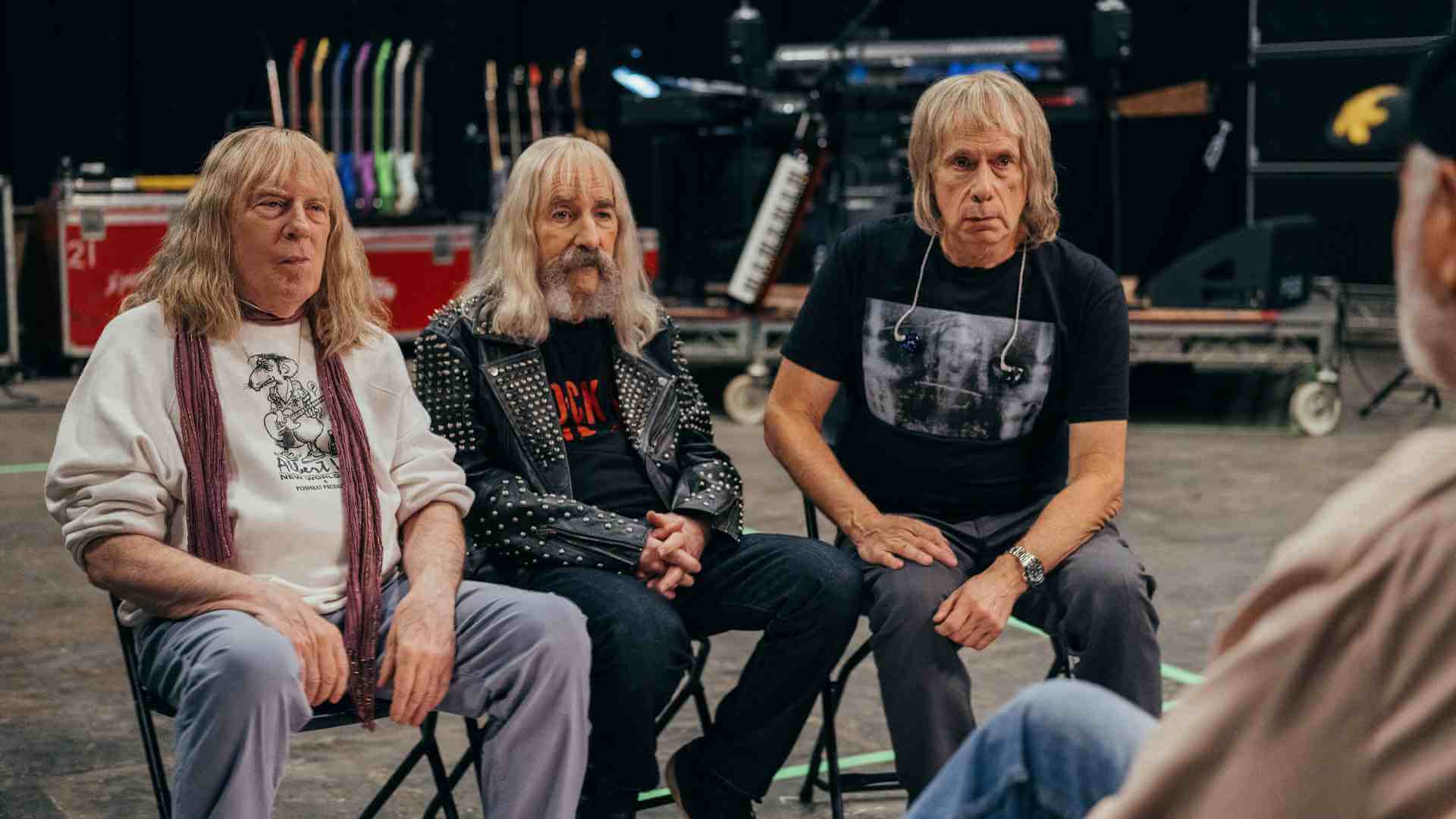Does the release of Spinal Tap II: The End Continues mark the actual end of England’s loudest band? Maybe, says Michael McKean, who plays David St. Hubbins: “If you only halfway exist, then vanishing altogether is not a big chore.” McKean, whose many other roles include Charles McGill on Better Call Saul and a recent Broadway stint in a Glengarry Glen Ross revival, recently hopped on a Zoom to talk four decades of Spinal Tap.
This is the first time you’ve done a full-length movie as Spinal Tap since the original. How did that feel?
We got to work on it a few years ago and met every day. Some days we would completely waste. We’d get into talking about old show business and prehistoric TV, part of which was Harry [Shearer, who plays Derek Smalls]. Harry’s been doing it since he was eight years old — he was on The Jack Benny Show. Chris [Guest] and I for somewhat less, but still we were the first generation of TV babies. We would waste as much time as we could, as long as there were snacks.
Eventually we put together an idea for the notion of one more concert. The guys aren’t speaking, but they’re gonna be thrown together for one more concert. Originally the idea was Ian Faith’s widow. We spoke with a few people. Kerry [Godliman] was obviously the best one, but she was way too young to be a widow. And she said, “How about I’m his daughter?” And we said, “Done.”
How was the actual production different from the original film?
It turned out to be a lot of fun. Shooting in New Orleans was a lot of fun. We certainly ate well. Some old pals came. But listen, it wasn’t the same as the first one. The first one was film. And we would watch dailies every single day. We all saw the four-and-a-half-hour assembly. Then we saw the two-and-three-quarter-hour assembly, and then we saw the two-hour-10. We went through this kind of winnowing down process and we killed a few darlings and a couple of the ugly children that we knew probably weren’t gonna make it anyway.
But it was just a very different process. The first time we saw any kind of assemblage of the film was when Rob [Reiner, the director] put together his 90-minute version, and there were things missing. “Maybe we could bring that back.” So we did some of that, but we never saw a four hour version.
We do explore what’s happening to these personalities, as odd and raggedy as they are. We never wanted them to be cartoons. We really wanted ’em to be real people.
Did themes of aging and mortality seep into your own thinking?
Oh, absolutely. There’s that moment when [the character] Simon suggests that one of us die and that would really sell this thing, and we have to actually think about it. David St. Hubbins has said that rock & roll keeps you young, but only if you die young. Otherwise, you’re just a regular old person.
How early did you start to see the absurd side of rock & roll?
Kind of immediately, when I was seven years old. Elvis was happening, and Elvis sang “Hound Dog” to a Basset Hound on TV. And even when I was seven, I knew that was pretty fucking stupid. I saw what they were doing. It’s like, man, leave it alone. Just have the guy sing.
So it’s not so much the absurdity of rock & roll, but the absurdity of the selling of it, and people’s attitudes from the inside, and the view that it’s something more important than it is. I think there’s probably less hubris in this film ’cause we’re already a little bit defeated and ragged because we’ve been around so long.
Did “Big Bottom” partly come from “Fat Bottomed Girls”?
Absolutely, by Queen. We thought, “Yeah, it does make the rockin’ world go round…” We just made it about one specific, made-up person. We really wrote that one all together. T-Rob gave us the first line, “Bigger the cushion, the sweeter the pushing,” and that’s something that he heard in the streets in the Bronx. Once we got the notion that we’re all playing basses and there’s primarily lower-end, the song is about itself.
What’s your memory of creating the Stonehenge gag?
I had read that some act had wanted to do a big Stonehenge set and they built it and couldn’t get it in the venue, and I thought, maybe we do this other thing, where it doesn’t work for another reason. It just seemed like a funny payoff to have this little tiny thing emerge.
What does it feel like to look in the mirror when you’re dressed as David St. Hubbins? It’s not like this sudden jump from 1984 to now — you’ve been this guy many times.
People mainly wanna talk to me about that. People do recognize me, but they recognize me as much for Clue. Weirdly, that was not a hit, but Clue was a big home-video thing, and people in their fifties are telling me, “That was my favorite movie when I was a kid.” But people recognize me for Tap. They wanna talk about it.
I mostly thought about what David was going through and what he was out to get. I think we know that he’s a very lonely guy We did a lot of interview stuff that’s not in the film, and I just got a chance to go wide with David’s last 15, 20 years. So I know stuff that you don’t know. But the bottom line is that he really missed this. He missed being part of a band, and I could see how you would if you had nothing else going on.
Do you approach dramatic roles essentially the same as you do comedy?
On Better Call Saul, someone else did all the writing for me. And they were really good at it. That’s top-line writing right there. It’s a different thing, because for one thing, I’ve never improvised a dramatic film. I would think that would be a little more limiting, because in the back of the brain, there’s the joke gland and that can’t help but be activated when you’re improvising a comedy, and you’re standing there with Fred Willard or Jennifer Coolidge, or these people that you know could destroy you, just because they’re so funny and so remarkable. So it’s just different when someone else is doing the talking for you.
What stands out in your memory from working with Elton John and Paul McCartney?
They were two different guys, obviously, and Elton’s stuff with us really revolves around the playing. He was great and very funny, and very pleasant and fun to be with. And Paul was a little bit more — the character of Paul McCartney was a little clearer.
Paul did the sweetest thing. My God. I was doing Glengarry Glen Ross on Broadway, and he came to see the show. He comes backstage and he gives me a big hug and everything. And somebody says, “Oh, you know each other?” And he said, “Yeah, we’re in a movie together.” He was just amazing. He was just great. And it was great to be at odds with him emotionally in the scene and in the repercussions of the scene. He was a hundred percent real. And he learned my dumb song that I wrote fortysomething years ago.
You guys are apparently playing one more concert. Would you be OK with that being the end of Spinal Tap?
Sure. If you only halfway exist, then vanishing altogether is not a big chore. We don’t wanna ride it too long. I don’t think this is the right age to be if you’re gonna go out on the road and do a real tour. So I’d be fine. Whatever happens, really.
Christopher Guest told me he’s retired from filmmaking. Does any part of you want to nudge him to do other stuff?
I wouldn’t nudge Chris. He does what he wants to do. I think maybe his last experience [as the writer-director of the 2016 comedy Mascots] wasn’t all positive. I don’t know. We’ve never really discussed it, but I think he felt like it was not presented well. I think he’d reached the end of that. I always thought that he should have pulled what one of the Zucker brothers did, just go rogue and do something that’s not a comedy. But you don’t tell Chris what to do. He’s made his own decisions and they’ve all worked out really well. These films are very influential in how comedy stories are told. That’s what he does.
Retirement doesn’t seem to be on your radar.
I worked with Jerry Orbach when I did a Law & Order, and I said, “How is it possible that in the course of four years I saw you do six [Broadway] shows?” He said, “I love to work more than anything.” And I said, “So when actors talk about retiring…” he goes, “Fuck that. When I wrap my last day, just take me right to the cemetery unless there’s a golf course on the way.” He had his priorities.
Six weeks before he passed, he was still working. He’s that guy, and my wife’s the same way. Retire? Come on. It’s silly. And I don’t have something as specific as Chris has to retire from. I’m just an actor. I’m a hired gun. I’ve done nine Broadway shows in the past 25 years. And I love it. And I love working on film too, except you gotta get up earlier. It’s just something I really love to do.
I have to mention your courtroom breakdown scene in Better Call Saul — it’s one of the greatest acting moments of the last few years.
I knew this guy, even as he was discovering that he didn’t know himself as well as he thought he did. I thought that was an interesting thing to play, the self-discovery that you’re still trying to keep at arm’s length. Usually, keeping it simple is the right thing. But this was a very complex character, and I had to keep all those plates in the air, and it just worked out. Gordon Smith wrote the script. Of course, everybody works on those scripts — Peter [Gould] and Vince [Gilligan] and Tom [Schnauz] and all these people work on these scripts and they get them perfect. It’s a really special case. Those guys really are the best.
Source link

